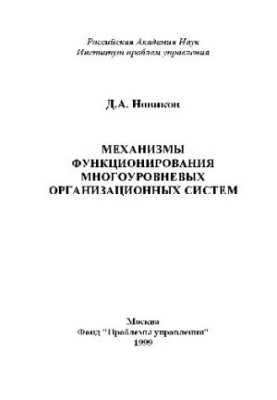Mechanisms of functioning of multilevel organizational systems
 Instant download
Instant download
after payment (24/7)
 Wide range of formats
Wide range of formats
(for all gadgets)
 Full book
Full book
(including for Apple and Android)
The paper considers the results of the analysis of theoretical and game models of planning and incentive mechanisms in multi-level organizational systems. Qualitatively new (inherent in multi-level systems compared to two-level) effects are investigated, reflecting the impact on the management efficiency of the following factors: aggregation factor, consisting in aggregation (t.) e. "coagulation", "compression" and t. d. ) information about system participants, subsystems, and t. d. as the level of hierarchy increases;-economic factor, consisting in changes in financial, material, etc.. resources of the system when changing the composition of system participants (managed entities, interim governing bodies, etc.) d. ) having their own interests ; Uncertainty factor, which consists in changing the awareness of system participants about significant internal and external parameters of functioning ; -organizational factor, which consists in changing the attitude of power, that is, the ability of some participants of the system to establish "rules of the game" for other participants; -information factor, which consists in changing the information load on the participants of the system. The principle of rational centralization is formulated, according to which such structures and mechanisms of management of the organizational system are rational, for which any permissible change in centralization, taking into account these factors, leads to a decrease in management efficiency.
LF/638053153/R
Data sheet
- Name of the Author
- Новиков Д.А.
- Language
- Russian
- Release date
- 1999
























